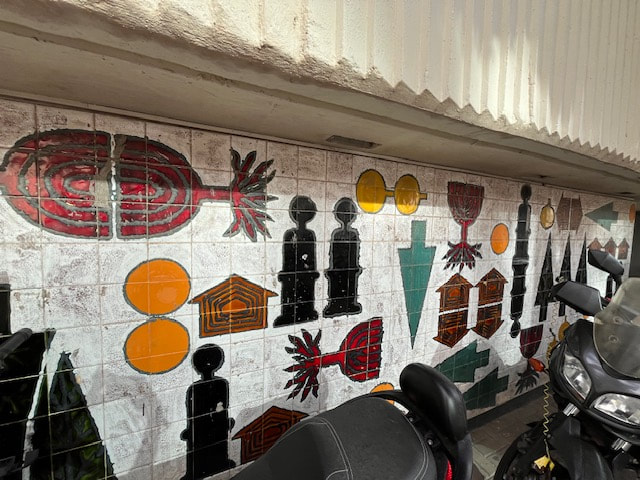On May 7 we met with Meital Bonchek.[1] Unlike many of the secular activists we met, Meital is an Ultraorthodox woman who finds herself politically adrift and connected to strange bedfellows. Having grown up and raising her own family in an Orthodox community in Israel, Meital unexpectedly found her way to a different kind of activism. And she has found her identity as an Orthodox feminist.
While attending Hebrew University as a young woman, Meital came across a book in the library on sex trafficking. She had never known of this phenomenon and began to explore whether it was a problem in Israel. Of course, she did learn that people are trafficked against their will for sex work, even in the Holy Land. Bonchek took a step that is unusual in Israel: she reached out to activists working on this issue on the left. As an Orthodox woman, the left and its activists were a foreign entity. And yet she forged ahead to build coalitions “across the aisle.”
What is remarkable about Meital’s story is that she did not “reach across the aisle” and stay there. She built partnerships, but used what she was learning to bring this taboo issue to her own community. Though Bonchek’s subset of the Orthodox community in Israel is not accustomed to pursuing “social justice,” its members are deeply ensconced in the Jewish concept of chesed—that is, acts of kindness that serve others. Bonchek and others are driven by the teachings of the prophets that we have ethical responsibilities to one another. (Much like Reform Judaism!)
Deeply driven by the stories, suffering and abuse of trafficked people, Bonchek began to explore how feminism could fit into the ethical edifice of halachic[2], Orthodox life. And, in doing so, she began to build a coalition of Orthodox, and secular, leftist activists. As part of this work, Bonchek began working with an organization called Ma’aglei Tzedek, which is a social justice group within Orthodoxy. She also serves as the Deputy Director of the ‘Briah Foundation.’[3] As the Founder and Co-Director of the Coalition of Religious Organizations to Combat Prostitution, Bonchek spoke to the Israeli Knesset about the issue. She has been instrumental, too, in shifting the conversation in the “religious” community away from the blaming and shaming of women involved in prostitution.
Orthodox, traditionally right-wing voices joined together with voices from the left, creating a partnership that has mobilized a national movement: a movement promoting a law to criminalize clients of prostitution.[4] The law they helped promote with activists from the left criminalizes not those who are engaged in prostitution against their will, but rather those choosing to utilize these services. Until the law passed, only traffickers were subject to criminal penalties. And, until Bonchek and her growing team began their activism, there were many in the Orthodox rabbinate who tended to blame the trafficked victims as moral failures.
It is no great surprise to anyone reading this that current Israeli politics is deeply divided. One’s identity is either one thing or the other. But, Bonchek was able to forge a coalition of left and right that led to a national movement. She shared with our group an insight, “We can belong to more than one group. Our identities are sometimes fluid.”
Straddling communities as she now does, Bonchek found herself in the astounding position of attending recent government protests of the right (in support of the proposed judicial overhaul) AND of the left (against it). "Her people" were in both camps. Rather than feeling adrift and out of place in either community, she is beginning to find a home in two different places.
Even so, she describes herself as having no political home. She is also in search of a new spiritual home.
Coda
When we asked about giving up land for peace—even the settlements where many in Bonchek's community reside—she broke the mold of the Ultraorthodox line. The right-wing idea that we should not give land for peace was not, for Bonchek, the edifice that it seems from the outside. Land for peace, she shared, would of course be worth it if it were really, actually, reliable peace. In sharing this view, Bonchek opened a surprising and unexpected crack in the occupation debate: An important part of what is standing in the way of land-for-peace negotiations on the right is not necessarily an unwillingness to bend, but rather a reticence to believe that true peace is possible.
[1] Religious-Zionists join fight against Israel's sex industry - Israel News - The Jerusalem Post (jpost.com)
[2] Halakhic - definition of Halakhic by The Free Dictionary
[3] The Briah Foundation
[4] Seeking prostitution services is now illegal in Israel | The Times of Israel








